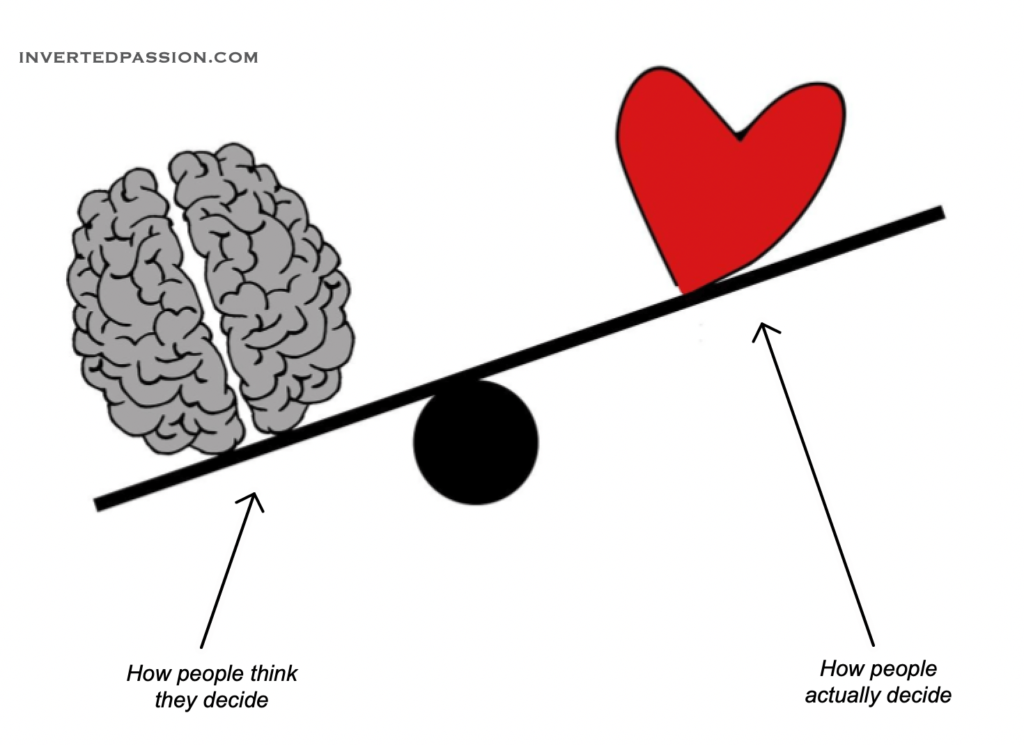Many evolutionary psychologists believe that reason evolved to justify our actions to strangers. This justification was necessary because strangers couldn’t take one another’s claims at face value. Such claims had to be backed with reasons to convince the other that one is not taking advantage of him/her.

As we all know, actions speak louder than words. And emotions drive our actions.
Even though the capacity to reason is a highlight for our species, most of our decisions are made emotionally. Who we fall in love with isn’t rational but we can always find good reasons to justify our choice of partner. Similarly, our reasons for choosing to use certain products or services have a strong emotional factor, even though when asked, we will happily give rational justifications for the same.
One of the biggest mistakes a marketer can do is to assume that potential customers will judge the product from a cost/benefit or a pros/cons point of view. When a product is pitched to them, customers don’t spend time evaluating its features and then decide if they’re going to buy it or not. Rather, their first reaction is from the gut. The pitch (in form of advertisement, website, or a sales call) has to cross many evolved defenses before customers even start paying attention to what’s on offer.
Customers are initially skeptical because that’s how we’re evolved to react to pitches. Imagine that in a primitive hunter-gatherer society many hundreds of thousands of years ago, someone comes along and suggests that there’s a bounty of food behind that hill. You’d expect people in that group to be skeptical of the claim because a) why would a stranger tell others about benefits that he himself can make use of; b) what if there’s hidden danger or cost which benefits the stranger and that’s why he’s enticing us.
So, people evolved to be skeptical at first of claims from strangers. And a pitch from a new company is nothing but a pitch for a bounty from a stranger.
To read more about how reasoning evolved in humans, go through the notes from a book I had read on this subject.
People’s (and hence customers’) gut reaction to the pitch is likely made up of hundreds of little heuristics that evolved over thousands of years to assist human decision-making over thousands of years. But we can isolate a few key factors that can help people decide in favor of a stranger’s pitch:
- Trust: are you giving a reason for people to trust? Research shows that people form a gut-level opinion on others as soon as they meet them. This initial impression tells them how skeptical and careful they should be in their interaction with a stranger. For example, a sales person who dresses nicely or a website that looks premium increases trust because people naturally assume that the stranger has enough resources himself that the likelihood of him cheating others for more resources is low. This property of good looks = more trust is exploited by many in the business world because it works.
- Social proof: do you have anyone else to back you up? A stranger who comes with a proof of someone familiar backing his claims has much higher likelihood to be believed than the one who just says: “trust me, I’m telling the truth”. This is why B2B websites and pitches are filled with social proof of prominent companies using their services, and this is also the same reason celebrities are effective in marketing. The most effective social proof is from a peer, which is why word of mouth is the most effective form of marketing (though it’s terribly hard to influence – your product or service has to be good enough that people talk about it by themselves without any prodding from your side).
- Evidence: what evidence do you have to back your claim? It’s just not enough to be likable and come with social proof. A successful pitch consists of evidence to back claims. However, it’s important to note that people only invest their time in listening to and evaluating evidence if first they feel they can trust you and you have enough social proof for them to even begin paying attention to what you’re saying. Order of these factors matter. You cannot overwhelm people with evidence first and then give reasons to trust. They will simply tune out and you’ll lose them.
- Effort: to get the benefits you’re promising, what are you asking in return (money, time, reputation)? Of course, people can still reject your pitch even if you’re trustworthy, have social proof backing you up, provide sufficient evidence for your claims. The golden rule of marketing is that people have to perceive that they’ll be getting much more than what they’re required to spend. Benefits don’t just have to be marginally better than costs – they have to be substantially better.
Remember: the first job of a marketer is to dismantle people’s automatic skepticism of strangers; only then should s/he proceed with the pitch.
This essay is part of my book on mental models for startup founders.
Join 200k followers
Follow @paraschopra